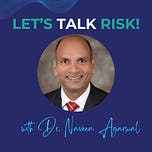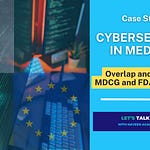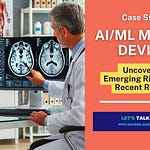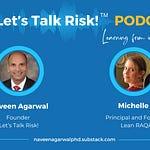Rapid advancement in digital technologies and cloud computing offer huge opportunities for medical devices, but they are also forcing us to change our approach to design, development and risk management.
In this high energy Let’s Talk Risk! conversation Randy Horton inspires us to take a risk-based approach when building and managing connected devices.
Historically, we have considered medical devices as a “fortress” with a high level of engineering control and a defensive “moat” of change control around them to ensure safety and effectiveness. In the new world of digital technologies and cloud computing, we need to think of them as “container ships” that need to safely reach their destination, but we cannot control the ocean.
That is why, we need to focus on resiliency and not redundancy. In the past, we tried to control every possible variable to the extent possible and minimize potential failures. Now, we have to acknowledge that medical devices operate in a complex environment, and that things will break down. We do have to apply solid engineering principles in design, but we also need to have a robust surveillance system in place to continually monitor data and take timely action when circumstances change without warning.
And we have to make risk-based design choices. As an example, certain software functions of a device involved in real-time decision making and life-saving action cannot be “outsourced” to the cloud. On the other hand, we can use cloud computing to monitor and analyze long-term data to improve our algorithms.
Randy encourages risk practitioners in the industry to get involved and shape this conversation. We don’t have to wait until new regulations are developed and finalized. Even the regulatory agencies are trying to figure out the best way to regulate software-based connected devices without slowing down the pace of innovation.
About Randy Horton
Randy Horton is currently the Chief Solutions Officer at Orthogonal, a product development and consulting firm specializing in Software as a Medical Device (SaMD), digital therapeutics (DTx) and connected devices. With a strong business and analytical acumen, Randy facilitates digital transformations by increasing internal agility, cultivating strategic partnerships, and implementing entrepreneurial ideas. He has over 20 years of experience in product management, business development and consulting. Randy graduated from the University of Michigan with a Bachelors in History and a Masters in Information Studies.
About Let’s Talk Risk! with Dr. Naveen Agarwal
Let’s Talk Risk! with Dr. Naveen Agarwal is a weekly live audio event on LinkedIn, where we talk about risk management related topics in a casual, informal way. Join us at 11:00 am EST every Friday on LinkedIn.
Disclaimer
Information and insights presented in this podcast are for educational purposes only. Views expressed by all speakers are their own and do not reflect those of their respective organizations.












